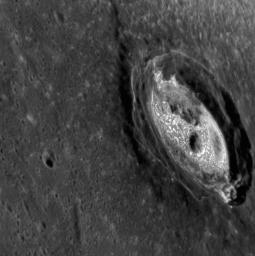The bright material on the floor of Kertész crater is not the water ice recently confirmed to be in craters near Mercury's poles, but it might well be behaving as ice would on another planet. Mercury's daytime temperatures are so hot at most latitudes that rocks that would be stable at other places in the Solar System may essentially evaporate on Mercury. That is one theory for the formation of these bright, irregular features known as hollows seen here and in many other craters on Mercury. (To see Kertész in 3D, get out your 3D glasses and check out this past featured image.)
This image was acquired as a high-resolution targeted observation. Targeted observations are images of a small area on Mercury's surface at resolutions much higher than the 200-meter/pixel morphology base map. It is not possible to cover all of Mercury's surface at this high resolution, but typically several areas of high scientific interest are imaged in this mode each week.
Date acquired: November 17, 2012
Image Mission Elapsed Time (MET): 261598284
Image ID: 2969138
Instrument: Narrow Angle Camera (NAC) of the Mercury Dual Imaging System (MDIS)
Center Latitude: 27.38°
Center Longitude: 145.5° E
Resolution: 46 meters/pixel
Scale: Kertesz crater is about 31 km (19 mi.) in diameter
Incidence Angle: 42.6°
Emission Angle: 59.7°
Phase Angle: 91.4°
The MESSENGER spacecraft is the first ever to orbit the planet Mercury, and the spacecraft's seven scientific instruments and radio science investigation are unraveling the history and evolution of the Solar System's innermost planet. Visit the Why Mercury? section of this website to learn more about the key science questions that the MESSENGER mission is addressing. During the one-year primary mission, MDIS acquired 88,746 images and extensive other data sets. MESSENGER is now in a year-long extended mission, during which plans call for the acquisition of more than 80,000 additional images to support MESSENGER's science goals.
For information regarding the use of images, see the MESSENGER image use policy.

 Planetary Data System
Planetary Data System












